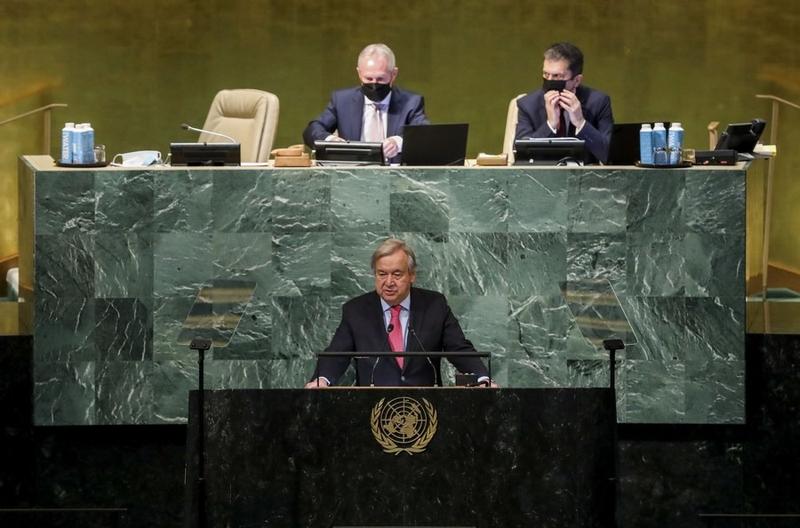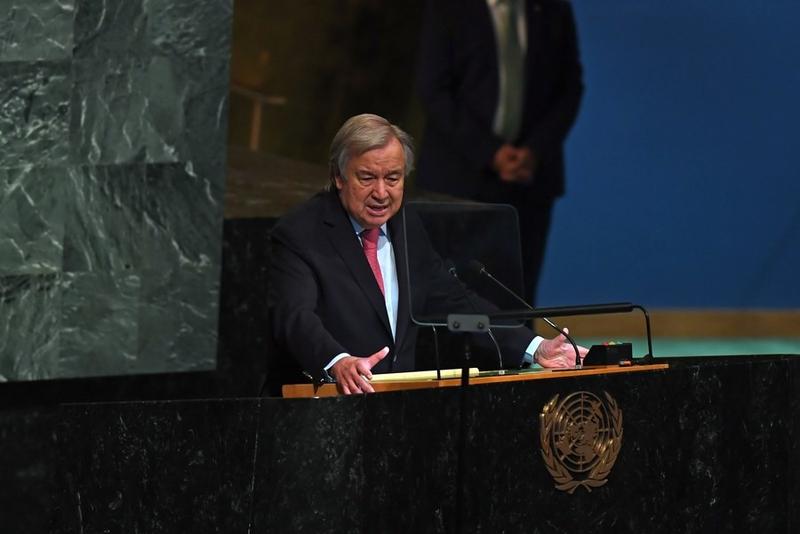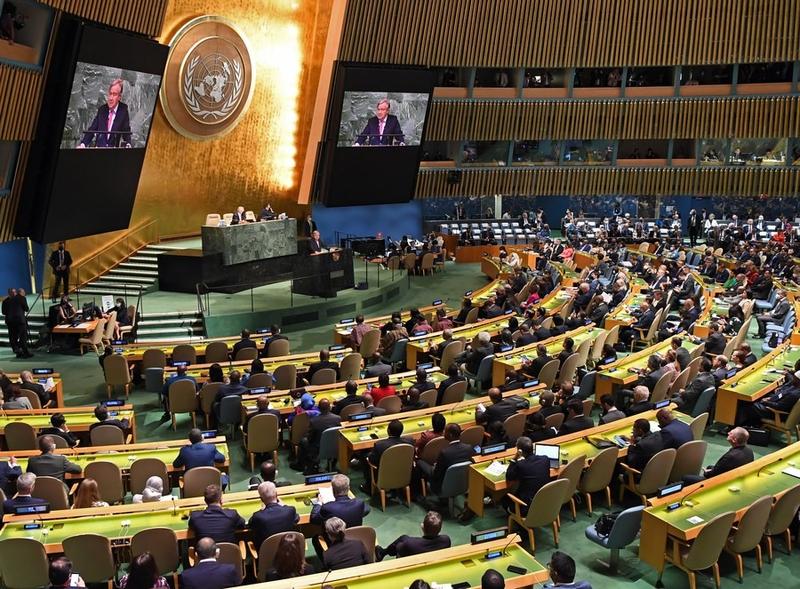 UN Secretary-General Antonio Guterres (front) speaks during the opening of the General Debate of the 77th session of the UN General Assembly at the UN headquarters in New York, Sept 20, 2022. (WANG YING / XINHUA)
UN Secretary-General Antonio Guterres (front) speaks during the opening of the General Debate of the 77th session of the UN General Assembly at the UN headquarters in New York, Sept 20, 2022. (WANG YING / XINHUA)
UNITED NATIONS - UN Secretary-General Antonio Guterres said on Tuesday that the world is in big trouble and needs collective action across the board.
Our world is in big trouble. Divides are growing deeper. Inequalities are growing wider. And challenges are spreading farther," Guterres said while addressing the UN General Assembly before the opening of the General Debate.
UN Secretary-General Antonio Guterres said crises like the conflict in Ukraine, climate emergency and biodiversity loss, and the dire financial situation of developing countries threaten the very future of humanity and the fate of the planet
"We need action across the board," he said.
At the same time, he warned that the international community is gridlocked in colossal global dysfunction, saying it is "not ready or willing to tackle the big dramatic challenges of our age."
ALSD READ: UN launches first-ever global finance facility for education
He said crises like the conflict in Ukraine, climate emergency and biodiversity loss, and the dire financial situation of developing countries threaten the very future of humanity and the fate of the planet.
Progress on all these issues and more is being held hostage to geopolitical tensions, he added.
"Geopolitical divides are undermining the work of the Security Council, undermining international law, undermining trust and people's faith in democratic institutions, undermining all forms of international cooperation."
"We cannot go on like this," he said.
Even the various groupings set up outside the multilateral system by some members of the international community have fallen into the trap of geopolitical divides, like the Group of 20 (G20), he said.
"At one stage, international relations seemed to be moving toward a G2 world; now we risk ending up with G-nothing. No cooperation. No dialogue. No collective problem-solving," said Guterres. "But the reality is that we live in a world where the logic of cooperation and dialogue is the only path forward. No power or group alone can call the shots. No major global challenge can be solved by a coalition of the willing. We need a coalition of the world."
ALSD READ: UN official calls for peaceful settlement of Armenia-Azerbaijan conflict
This coalition of the world must urgently overcome divisions and act together. It starts with the core mission of the United Nations — achieving and sustaining peace, said Guterres.
"We are seeing the threat of dangerous divisions between West and South. The risks to global peace and security are immense. We must keep working for peace in line with the United Nations Charter and international law," he said.
At the same time, conflicts and humanitarian crises are spreading. The funding gap for the UN Global Humanitarian Appeal stands at US$32 billion, the widest ever, he said.
 UN Secretary-General Antonio Guterres speaks at the opening of the General Debate of the 77th session of the UN General Assembly at the UN headquarters in New York, Sept 20, 2022. (LI RUI / XINHUA)
UN Secretary-General Antonio Guterres speaks at the opening of the General Debate of the 77th session of the UN General Assembly at the UN headquarters in New York, Sept 20, 2022. (LI RUI / XINHUA)
Upheaval abounds — in Afghanistan, the Democratic Republic of the Congo, the Horn of Africa, Haiti, Libya, Iraq, Israel and Palestine, Myanmar, the Sahel, Syria. The list goes on, he noted.
Meanwhile, nuclear saber-rattling and threats to the safety of nuclear plants are adding to global instability. Last month's review conference of the Nuclear Non-Proliferation Treaty failed to reach consensus and a nuclear deal with Iran remains elusive, he added.
"We need much more concerted action everywhere anchored in respect for international law and the protection of human rights. In a splintering world, we need to create mechanisms of dialogue and mediation to heal divides," said Guterres. "We are committed to make the most of every diplomatic tool for the pacific settlement of disputes, as set out in the United Nations Charter: negotiation, inquiry, mediation, conciliation, arbitration and judicial settlement."
"There is another battle we must end: our suicidal war against nature," he said.
The climate crisis is the defining issue of our time. It must be the first priority of every government and multilateral organization. And yet climate action is being put on the back burner, despite overwhelming public support around the world, he lamented.
Global greenhouse gas emissions need to be slashed by 45 percent by 2030 to have any hope of reaching net-zero emissions by 2050. And yet emissions are going up at record levels — on course to a 14 percent increase this decade, he noted.
"We have a rendezvous with climate disaster," warned Guterres. The hottest summers of today may be the coolest summers of tomorrow. Once-in-a-lifetime climate shocks may soon become once-a-year events.
The climate crisis is a case study in moral and economic injustice. The G20 emits 80 percent of all greenhouse gas emissions. But the poorest and most vulnerable — those who contributed least to this crisis — are bearing its most brutal impacts. Meanwhile, the fossil fuel industry is feasting on hundreds of billions of dollars in subsidies and windfall profits while household budgets shrink and the planet burns, he said.
ALSD READ: UN envoy sees opportunity to end political crisis in Sudan
Guterres called on all developed economies to tax the windfall profits of fossil fuel companies, and re-direct the funds to countries suffering loss and damage caused by the climate crisis and to people struggling with rising food and energy prices.
"We need to hold fossil fuel companies and their enablers to account," he said.
He asked for a transition to renewable energy, which generates three times more jobs, is already cheaper than fossil fuels and is the pathway to energy security, stable prices and new industries.
Developing countries need help to make this shift, including through international coalitions to support just energy transitions in key emerging economies, he said.
He asked for assistance to developing countries in adapting to worsening climate shocks.
Resilience-building in developing countries is a smart investment — in reliable supply chains, regional stability and orderly migration, he said.
He asked for efforts to address loss and damage from disasters.
 UN Secretary-General Antonio Guterres (at the podium and on the screens) speaks during the opening of the General Debate of the 77th session of the UN General Assembly at the UN headquarters in New York, Sept 20, 2022. (LI RUI / XINHUA)
UN Secretary-General Antonio Guterres (at the podium and on the screens) speaks during the opening of the General Debate of the 77th session of the UN General Assembly at the UN headquarters in New York, Sept 20, 2022. (LI RUI / XINHUA)
Vulnerable countries need meaningful action. Loss and damage are happening now, hurting people and economies now, and must be addressed now. This is a fundamental question of climate justice, international solidarity and trust, he said.
Guterres also stressed the need to address the biodiversity crisis.
The world must agree on a post-2020 global biodiversity framework — one that sets ambitious targets to halt and reverse biodiversity loss, provides adequate financing and eliminates harmful subsidies that destroy ecosystems on which we all depend, he said.
Guterres warned that a once-in-a-generation global cost-of-living crisis is fuelling social unrest.
Some 94 countries, home to 1.6 billion people - many in Africa - face a perfect storm: economic and social fallout from the pandemic, soaring food and energy prices, crushing debt burdens, spiraling inflation, and a lack of access to finance. These cascading crises are feeding on each other, compounding inequalities, creating devastating hardship, delaying the energy transition, and threatening a global financial meltdown, he said.
"Social unrest is inevitable - with conflict not far behind," he warned.
It doesn't have to be this way. A world without extreme poverty, want or hunger is not an impossible dream. It is within reach. That is the world envisaged by the 2030 Agenda and the Sustainable Development Goals (SDGs)," he said. "But it is not the world we seem to have chosen. Because of our decisions, sustainable development everywhere is at risk."
The SDGs are issuing an SOS. Even the most fundamental goals -- on poverty, hunger and education -- are going into reverse. More people are poor. More people are hungry. More people are being denied health care and education. Gender equality is going backward and women's lives are getting worse, from poverty to choices around sexual and reproductive health, to their personal security, he noted.
Guterres called for concerted action to help developing countries, which are getting hit from all sides.
"Today, I am calling for the launch of an SDG Stimulus — led by the G20 — to massively boost sustainable development for developing countries. The upcoming G20 Summit in Bali, Indonesia, is the place to start," he said.
The SDG Stimulus has four components: multilateral development banks, debt relief, an expansion of liquidity, and the strengthening of specialized funds like Gavi (the Vaccine Alliance), the Global Fund to Fight AIDS, Tuberculosis and Malaria, and the Green Climate Fund, said Guterres.
The divergence between developed and developing countries — between North and South, between the privileged and the rest — is becoming more dangerous by the day. It is at the root of the geopolitical tensions and lack of trust that poison every area of global cooperation, from vaccines to sanctions to trade, he said.
"But by acting as one, we can nurture fragile shoots of hope," he said. "So let's develop common solutions to common problems - grounded in goodwill, trust, and the rights shared by every human being. Let's work as one, as a coalition of the world, as united nations."


